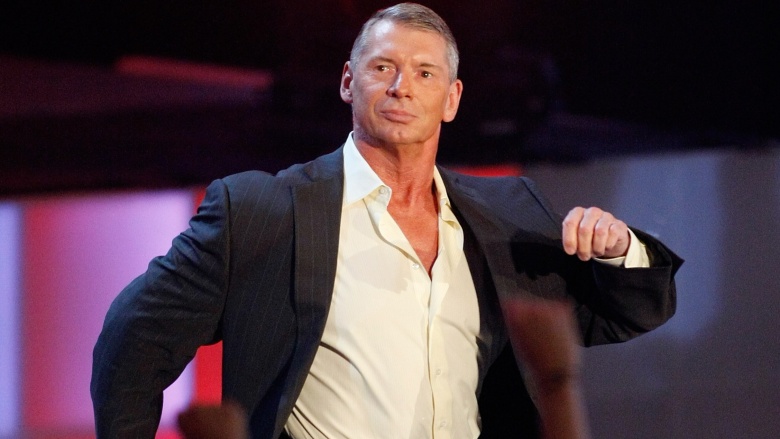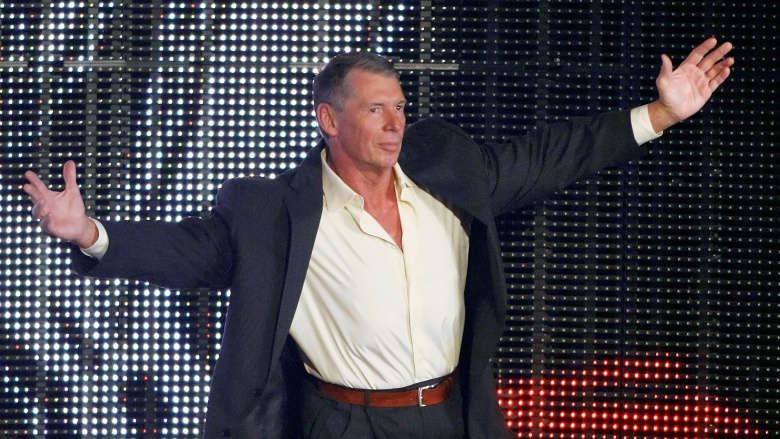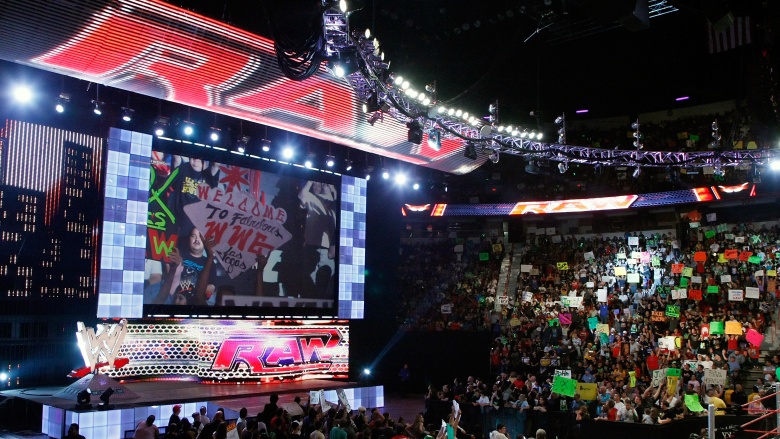Is The WWE Really Fake?
You're probably thinking, "duh!" in response to this article's title. After all, few things in this world seem as certain as the idea of WWE a series of increasingly fake wrestling shows. The thing is, "fake" is too general a term to explain the surprisingly complex nature of how WWE operates. It's not just that WWE is "fake" — it's that the company (loosely) relies on a decades-old method of operation that entertains fans while offering a wink-nudge throwback to the carny origins of professional wrestling.
The WWE borrows heavily from the old carny concept of kayfabe...
Bleacher Report writer Josh McCain acknowledges that the reason WWE struggles to be taken seriously by mainstream American audiences is its "carny roots." WWE's entire set-up relies very heavily on the concept of kayfabe — also known as the carefully cultivated illusion that what fans are seeing is 100 percent real. The idea originated on the carnival circuit, along with near-limitless lingo, slang, and cues that separated insiders and fans in the know, from the naive, wide-eyed wrestling fan who thinks the spandex, make-up, anger, violence, and results is totally legit.
Maintaining kayfabe at all times is impossible in an internet-friendly world, but it's not like WWE owner Vince McMahon didn't break with tradition long before anyone heard of YouTube ...
Vince McMahon broke kayfabe in the '80s ... to avoid sports regulations
As much as pro wrestling's origin on the carnival circuit gets blamed for WWE's lack of mainstream respect, the flip side of the coin is kayfabe absolutely worked to the company's advantage when looking to dodge heavy (and expensive) sports regulation.
WWE owner Vince McMahon, and others, infamously broke with kayfabe traditions in 1989 when speaking before the New Jersey Senate. As the New York Times reported, WWE — then known as the WWF — insisted that wrestling was just a rigged spectacle, existing solely for entertainment purposes. The testimonies by WWE representatives allowed for the successful passage of a deregulation bill in New Jersey. As a result, WWF performers wouldn't have to be licensed to work in a particular state, nor would they have to pass a doctor's exam before every match, nor would McMahon have to pay state taxes for his show to appear on TV.
Despite this very public violation of kayfabe, would you believe McMahon blew his top over wrestlers acting out of character in comparatively smaller ways?
The WWE's dedication to fakery is rather inconsistent
WWE Superstars Rusev and Lana landed in hot water when they decided to go public with their relationship, indirectly confirming it through gossip site TMZ. One of the main reasons WWE boss Vince McMahon was so upset? At the time, the announcement interfered with the nature of their characters' stories, as they were meant to be paired with other Superstars at the time. McMahon was well aware of the relationship, but didn't approve the manner in which the couple made it official. It's a hilarious double-standard; after all, this is the same man that shattered kayfabe to get deregulated and save himself boatloads of cash.
Besides, it's not like pro wrestlers have never dated each other. And it certainly isn't as if WWE hasn't benefited from working the most scandalous of these relationships into the actual show. For instance, Triple H cheated on his late ex-girlfriend, Chyna, dumping her for Stephanie McMahon — Vince McMahon's daughter. A more potent example would be the infamous Edge/Lita/Matt Hardy storyline, a TV tale based on the fact that Lita really did have a torrid affair with Edge behind then-boyfriend Matt Hardy's back.
The Rusev/Lana pearl-clutching was a bit much, especially since even the 10-year-olds McMahon desperately wants to bamboozle probably don't remotely buy into kayfabe anyway, since they can regularly find their favorite wrestlers out of character right on social media.
WWE will pause kayfabe for real-life tragedies
When a serious injury or tragic death happens, it makes no sense to stay in character or continue with business as usual. Even if WWE is first and foremost about entertaining fans, death and tragedy affects all human beings, and it's perhaps the most logical reason to break the fourth wall.
That was certainly the case when beloved WWE Superstar Eddie Guerrero suddenly died. As demonstrated in the above video, in the immediate aftermath of the popular wrestler's death, the WWE made the decision to acknowledge his impact and let everyone — even those who supposedly hated him in storyline — mourn his loss with WWE fans.
Exceptions aside, the WWE is as scripted as a Kardashian-based TV show
The previously mentioned incidents are the exceptions to the rule, as the WWE continues to rely heavily upon writers and scripts to drive its various storylines forward. Wrestling rivalries and feuds rarely begin by accident — usually the rise and fall of various WWE Superstars is planned in minute detail. You can actually find WWE scripts online, if you know where to look. For instance, in 2009, Wrestle Zone posted a leaked 12-page Monday Night Raw script. If you have any questions about whether or not it's legit, go read pages 6 and 7 and then watch this YouTube video:
It's important to remember that the leaked script is a first draft, meaning some changes were definitely made before the final version. However, much of the dialogue in the above video is almost word-for-word what you see in the script.
Interestingly, many WWE fans don't seem too bothered by the notion of heavily scripted shows. Their problem is when certain WWE stars make it very obvious they're reading from a script. This was a hilariously common complaint against commentator Michael Cole as he called the Shane McMahon vs. The Undertaker match from WrestleMania 32:
If you look closely, you will see blatant script-reading at certain points in the above video. Whoops.
You can often hear WWE stars communicating moves to "opponents"
With boxing or MMA, the entire point of a bout is unapologetic violence and bloodshed. That doesn't mean that pro wrestling is a painless endeavor where no one ever gets hurt, however. On the contrary, it takes a ton of skill and outstanding timing to land moves that appear painful while actively avoiding harm. That's why communication is so important. Unfortunately, some of that communication gets picked up by the surrounding microphones, making it possible for WWE fans to hear WWE stars loudly improvising upcoming wrestling moves with one another.
The above video features actual conversations between wrestlers where they direct the action move by move — effectively killing any suspended disbelief among TV viewers.
The security/police officers are often wrestlers themselves
In a memorable WWE moment, Stone Cold stunned fans (as opposed to what he usually does: stun his enemies) by seemingly caving to Vince McMahon's demands to be a more "refined" WWE champion. The situation (predictably) went south. Even though McMahon was accompanied by two police officers, the men do nothing while McMahon is physically assaulted in front of them. Despite the lack of consequences in the above video, much was made of Stone Cold's alleged arrest in the clip below:
Confused at the inconsistency? Well, don't be. These stunts are all part of the show. The police officers and security guards you see on RAW or SmackDown are almost always independent wrestlers looking for a bit of additional exposure (and a healthy dose of WWE money). However, sometimes a stunt involving the police goes so far, some of the more naive WWE fans buy it as genuine. This once led to confused (and presumably frustrated) members of the NYPD fielding calls from irate wrestling fans in response to Vince McMahon's fake arrest.
In the end, "fake" is a relative term
Although WWE is roundly criticized and mocked for being fake, there are other terms that would be more appropriate. The WWE is scripted, acted, and pre-planned, but that doesn't prevent dangerous, or even fatal, injuries. It also doesn't make the wrestlers themselves anything other than incredibly skilled athletes who put their bodies on the line week after week to entertain millions of fans around the world.





